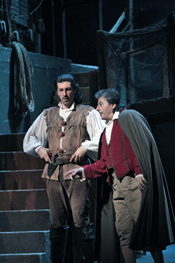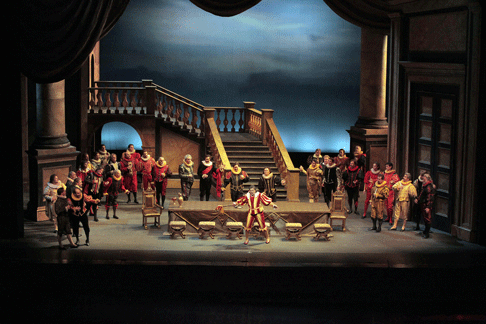![Giuseppe Gipali as the Duke of Mantua and L’ubica Vargicová as Gilda in San Diego Opera’s Rigoletto [Photo © Ken Howard]](http://www.operatoday.com/Rigoletto_SanDiego_09_01.gif)
01 Apr 2009
Rigoletto at San Diego Opera
In the current weak economy many an opera company has retrenched its programming to present primarily the most popular operas.
English Touring Opera are delighted to announce a season of lyric monodramas to tour nationally from October to December. The season features music for solo singer and piano by Argento, Britten, Tippett and Shostakovich with a bold and inventive approach to making opera during social distancing.
This tenth of ten Live from London concerts was in fact a recorded live performance from California. It was no less enjoyable for that, and it was also uplifting to learn that this wasn’t in fact the ‘last’ LfL event that we will be able to enjoy, courtesy of VOCES8 and their fellow vocal ensembles (more below …).
Ever since Wigmore Hall announced their superb series of autumn concerts, all streamed live and available free of charge, I’d been looking forward to this song recital by Ian Bostridge and Imogen Cooper.
The Sixteen continues its exploration of Henry Purcell’s Welcome Songs for Charles II. As with Robert King’s pioneering Purcell series begun over thirty years ago for Hyperion, Harry Christophers is recording two Welcome Songs per disc.
Although Stile Antico’s programme article for their Live from London recital introduced their selection from the many treasures of the English Renaissance in the context of the theological debates and upheavals of the Tudor and Elizabethan years, their performance was more evocative of private chamber music than of public liturgy.
In February this year, Albanian soprano Ermonela Jaho made a highly lauded debut recital at Wigmore Hall - a concert which both celebrated Opera Rara’s 50th anniversary and honoured the career of the Italian soprano Rosina Storchio (1872-1945), the star of verismo who created the title roles in Leoncavallo’s La bohème and Zazà, Mascagni’s Lodoletta and Puccini’s Madama Butterfly.
Evidently, face masks don’t stifle appreciative “Bravo!”s. And, reducing audience numbers doesn’t lower the volume of such acclamations. For, the audience at Wigmore Hall gave soprano Elizabeth Llewellyn and pianist Simon Lepper a greatly deserved warm reception and hearty response following this lunchtime recital of late-Romantic song.
Collapsology. Or, perhaps we should use the French word ‘Collapsologie’ because this is a transdisciplinary idea pretty much advocated by a series of French theorists - and apparently, mostly French theorists. It in essence focuses on the imminent collapse of modern society and all its layers - a series of escalating crises on a global scale: environmental, economic, geopolitical, governmental; the list is extensive.
For this week’s Live from London vocal recital we moved from the home of VOCES8, St Anne and St Agnes in the City of London, to Kings Place, where The Sixteen - who have been associate artists at the venue for some time - presented a programme of music and words bound together by the theme of ‘reflection’.
'Such is your divine Disposation that both you excellently understand, and royally entertaine the Exercise of Musicke.’
Amongst an avalanche of new Mahler recordings appearing at the moment (Das Lied von der Erde seems to be the most favoured, with three) this 1991 Mahler Second from the 2nd Kassel MahlerFest is one of the more interesting releases.
‘And there was war in heaven: Michael and his angels fought against the dragon; and the dragon fought and his angels, And prevailed not; neither was their place found any more in heaven … that old serpent … Satan, which deceiveth the whole world: he was cast out into the earth, and his angels were cast out with him.’
If there is one myth, it seems believed by some people today, that probably needs shattering it is that post-war recordings or performances of Wagner operas were always of exceptional quality. This 1949 Hamburg Tristan und Isolde is one of those recordings - though quite who is to blame for its many problems takes quite some unearthing.
There was never any doubt that the fifth of the twelve Met Stars Live in Concert broadcasts was going to be a palpably intense and vivid event, as well as a musically stunning and theatrically enervating experience.
‘Love’ was the theme for this Live from London performance by Apollo5. Given the complexity and diversity of that human emotion, and Apollo5’s reputation for versatility and diverse repertoire, ranging from Renaissance choral music to jazz, from contemporary classical works to popular song, it was no surprise that their programme spanned 500 years and several musical styles.
The Academy of St Martin in the Fields have titled their autumn series of eight concerts - which are taking place at 5pm and 7.30pm on two Saturdays each month at their home venue in Trafalgar Square, and being filmed for streaming the following Thursday - ‘re:connect’.
The London Symphony Orchestra opened their Autumn 2020 season with a homage to Oliver Knussen, who died at the age of 66 in July 2018. The programme traced a national musical lineage through the twentieth century, from Britten to Knussen, on to Mark-Anthony Turnage, and entwining the LSO and Rattle too.
With the Live from London digital vocal festival entering the second half of the series, the festival’s host, VOCES8, returned to their home at St Annes and St Agnes in the City of London to present a sequence of ‘Choral Dances’ - vocal music inspired by dance, embracing diverse genres from the Renaissance madrigal to swing jazz.
Just a few unison string wriggles from the opening of Mozart’s overture to Le nozze di Figaro are enough to make any opera-lover perch on the edge of their seat, in excited anticipation of the drama in music to come, so there could be no other curtain-raiser for this Gala Concert at the Royal Opera House, the latest instalment from ‘their House’ to ‘our houses’.
"Before the ending of the day, creator of all things, we pray that, with your accustomed mercy, you may watch over us."
![Giuseppe Gipali as the Duke of Mantua and L’ubica Vargicová as Gilda in San Diego Opera’s Rigoletto [Photo © Ken Howard]](http://www.operatoday.com/Rigoletto_SanDiego_09_01.gif)
In the current weak economy many an opera company has retrenched its programming to present primarily the most popular operas.
Think of it as operatic comfort food, if you will, in stomach-rattling times. San Diego Opera seems to have gone further, deciding to present its operas in stagings that can remind its audiences of long past high-rolling days.
Ian Campbell at San Diego Opera apparently discovered a secret trove of older New York City Opera productions, entirely traditional and only faintly musty. Spare but practical settings of Il Barbiere di Siviglia and Maria Stuarda were used in recent seasons, and the program for this season’s Rigoletto offers the vague credit “Scenery and costumes created for New York City Opera.” Elsewhere Carl Toms is identified as the creator, but no year is provided.
It looks to be from the mid-1970s, possibly early 1980s. Scene one of act one gets a handsome setting, with a palatial staircase dominating the picture, along with an oversized statue of an unidentified royal figure. The back opens to a deep view of a nighttime sky, which might get a little chilly for the attendees of the Duke’s get-together but adds to the atmosphere. A very lengthy scene change produced a less impressive set for scene two, with Rigoletto’s quarters being not much more than an iron gate and a staircase to an off-stage residence. This configuration returns to the stage the convention of characters using a gate when they could just step around it. Act two, supposedly the Duke’s private apartment, simply removed the statue from the act one set. Act three, tricky to stage with its action in the inn combined with positions for Gilda and Rigoletto to eavesdrop, as well as a riverbank locale, came off fairly well, if looking a bit like something from the old Disneyland Pirates of the Caribbean ride. The evening’s one innovation came across as superfluous, if not baffling: brief title screens, as if from a silent film, appeared before each curtain, mostly declaring that Rigoletto is an evil figure - arguable but still an odd framing device.
 Arutjun Kotchinian as Sparafucile and Lado Ataneli as Rigoletto
Arutjun Kotchinian as Sparafucile and Lado Ataneli as Rigoletto
Lotfi Mansouri is just the director for such a production, as he favors the stock gesture and routine stage movement. For a tenor such as Giuseppe Gipali, the Duke, the result was a stiff, uncharismatic performance. And Gipali does not have the voice to excuse such dramatic weakness. His tenor refuses to project unless at the very top of his range, and it possesses no interesting colors. L’ubica Vargicová, however, revealed a keen identification with the character of Gilda, evoking her innocence and faith without seeming weak or foolishly deluded. Even better, Vargicová sings beautifully, managing the trickier parts with no evident effort (she is also a successful Queen of the Night), and dominating many ensembles with her penetrating sound. It wasn’t always beautiful, but it was mostly exciting, and the San Diego audience greeted her passionately at final curtain.
Lado Ataneli has not proven himself in the past to be a captivating performer, but his dark baritone is a top class instrument. He really gave himself completely to this role, and if he had been in a production with a bit more imagination, he could have had even more impact. At least vocally, however, he could dominate most scenes, and the end of act two, in the duet with Gilda, became the highlight of the evening.
 A scene from Rigoletto
A scene from Rigoletto
Ian Campbell cast the rest of the opera from strength, with a very sexy Kristin Chavez as Maddalena, and the truly scary, rail-thin Sparafucile of Arutjun Kotchinian, his bass oozing out of him. Malcolm Mackenzie stood out in his brief appearances as Marullo, unctuous and self-satisfied, as did the tragic Monterone of Scott Sikon.
The capable Edoardo Müller did his usual efficient work with the orchestra, although the act three quartet lacked punch and cohesiveness.
The program featured photographs of previous San Diego Rigoletto productions, and the 2002 snapshots revealed a fresh, updated approach. Either it was a failure at the time, or Campbell just decided that staging is not what his audience is currently in the mood for. Which is fine, but traditional stagings need fresh approaches as well. Despite the fine work of Ataneli and Vargicová, some cobwebs remained on the set by the end of the evening.
Chris Mullins